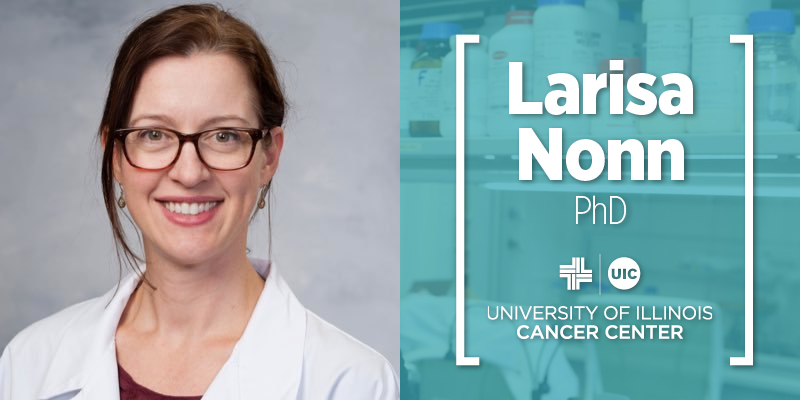
Larisa Nonn has received a grant from the U.S. Department of Defense to understand why a large gap exists between Black and white men being diagnosed with prostate cancer. Black men contract the disease at a younger age, the growth is more aggressive in nature, and causes twice as many deaths.
“Given the younger age and more aggressive the disease, it is likely there are biological underpinnings of prostate cancer distinct in African American men,” said Nonn, PhD, associate professor of pathology at the University of Illinois College of Medicine and member of the University of Illinois Cancer Center’s Translational Oncology Program. “Population-based studies, human clinical trials, and animal studies consistently support that higher androgen levels – the hormones that play a role in male traits and reproductive activity – promote the development of prostate cancer.”
Prior studies conducted in Nonn’s laboratory found for the first time ever that Black men have higher levels of the active androgen dihydrotestosterone (DHT) in their prostate compared to white men, potentially leading to cancer. There have been a plethora of studies that quantify androgens in localized prostate cancer, but none have focused on the disparity, which is a novel concept, she said.
“Our new study will comprehensively assess ancestry-related differences in androgen responses within the prostate so we can identify key pathways driven by androgens in African American men,” Nonn said.
“We are uniquely suited for this project because of UI Health’s diverse patient population and our expertise in patient-derived models that are needed to reflect the African American population. Understanding and defining ancestry-associated differences in androgen responses could lead to an improved prostate cancer screening strategy in African American men and provide us with important data for future studies.”
Other than skin cancer, prostate cancer is the most common cancer in American men. The American Cancer Society estimates that about 191,930 new cases of prostate cancer will be recorded in the United States this year, with about 33,330 deaths from the disease occurring. About one man in nine will be diagnosed with prostate cancer during his lifetime. It is more likely to develop in older men and in Black men. About six cases in 10 are diagnosed in men who are aged 65 or older, and it is rare in men under 40. The average age at diagnosis is about 66.
In the UI Cancer Center’s catchment area – Cook County – 114 out of 100,000 men were diagnosed with prostate cancer from the years 2013-2017, the latest figures available from the Centers for Disease Control and Prevention; 98.7 out of 100,000 were white, compared to 171.6 per 100,000 Black. Prostate cancer mortality rates in Cook County numbered 23 per 100,000 men for the years 2013-2017, with 18.2 per 100,000 being white and 44.1 per 100,000 being Black.
The research of the androgen response in a diverse cohort could lead to new therapeutic targets for Black men that may improve clinical outcomes compared to anti-androgens alone, Nonn said.
Nonn’s grant runs for three years and is her fourth Department of Defense funded project as a UIC faculty member. She previously received one of the grants as a postdoctoral fellow at Stanford University. Her latest project complements other work she has conducted in her laboratory that has examined vitamin D deficiency as the cause of high dihydrotestosterone levels in Black men.
“Taken together, within the next four years, our data may support a clinically actionable approach to reducing prostate dihydrotestosterone and ultimately cancer risk in the African American population by reducing vitamin D deficiency,” Nonn said.
Nonn will be assisted by Donald Vander Griend, PhD, associate professor of pathology, and Renee de Leeuw, PhD, assistant professor of pathology. Vander Griend and de Leeuw are both members of the UI Cancer Center’s Translational Oncology Program.
